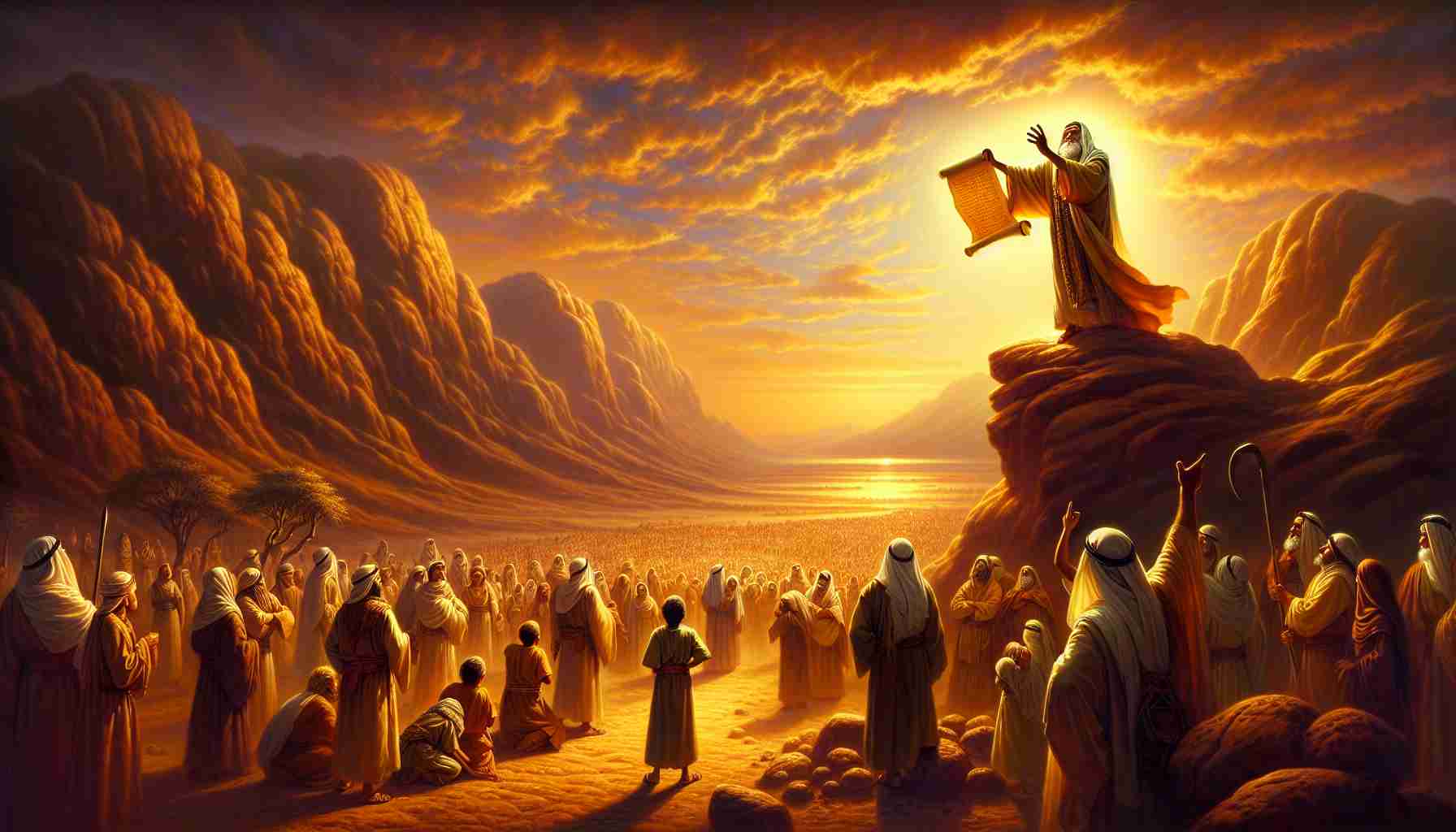

I had just turned seventeen the season Moses sang his final song over our camp. I was tending to the donkeys that morning, tightening the ropes and wondering why my hands trembled more than usual. Maybe it was the strange quiet you only hear before something holy happens. My name doesn't matter—no one wrote it down—but I was there.
The sun had barely crested the horizon when word spread: Moses—our leader since Egypt, the one who split the sea and spoke with God—was about to speak his last words.
I ran.
Dust clung to my legs as I pushed through families wrapping the morning bread and elders kneeling in prayer. I needed to hear this—every word. Not because I expected something new. By then, we’d heard Moses teach a thousand times. But something in my chest told me this was different.
He stood tall, older than I’d ever seen him, with skin like leather stretched over flame. But his eyes burned like always—with truth, and something softer. Maybe sorrow.
Then he sang.
It wasn’t the kind of melody that made your feet tap. It was like watching thunder walk. Each line named our tribes—Judah, Benjamin, Levi, and the rest—calling out who we were and who we were meant to be. He reminded us that God had been with us since Sinai, the mountain where we received the Ten Commandments, and all the way through the wilderness.
“…The eternal God is your refuge,” he sang, “and underneath are the everlasting arms.”
I didn’t expect to cry. But I did. Quietly, like the earth weeping dew before dawn. Maybe because I wasn’t just hearing history—I was part of it. We all were.
I remembered how scared I’d been in the early days, walking through dry riverbeds that had been oceans. I remembered the hunger, the quail, the heavenly manna we gathered each morning. And I remembered the rebellions—when fear swallowed faith. Always, Moses stood in the gap between us and God.
But now, he was leaving.
As he sang about each tribe’s gifts and future, I looked around. Faces were wet, jaws trembling. We knew he wouldn’t step into the Promised Land. Joshua would lead us now. But it was Moses whose voice carved this truth into us: we weren’t just survivors—we were a people chosen by God.
When the song ended, there was silence that wrapped us tight, like a prayer we didn’t know how to speak.
I wish I could explain what changed in me that day. I had always believed in God. But after hearing Moses’ song, my belief grew roots. I wasn’t lost or wandering—not anymore. I was claimed. Named. Held.
Later, I sat under a tree, watching the sun climb higher. I whispered a piece of the song over and over: “Happy are you, Israel! Who is like you, a people saved by the Lord?”
No one answered. But somehow, I felt God’s presence in the stillness—and I knew that was enough.
I had just turned seventeen the season Moses sang his final song over our camp. I was tending to the donkeys that morning, tightening the ropes and wondering why my hands trembled more than usual. Maybe it was the strange quiet you only hear before something holy happens. My name doesn't matter—no one wrote it down—but I was there.
The sun had barely crested the horizon when word spread: Moses—our leader since Egypt, the one who split the sea and spoke with God—was about to speak his last words.
I ran.
Dust clung to my legs as I pushed through families wrapping the morning bread and elders kneeling in prayer. I needed to hear this—every word. Not because I expected something new. By then, we’d heard Moses teach a thousand times. But something in my chest told me this was different.
He stood tall, older than I’d ever seen him, with skin like leather stretched over flame. But his eyes burned like always—with truth, and something softer. Maybe sorrow.
Then he sang.
It wasn’t the kind of melody that made your feet tap. It was like watching thunder walk. Each line named our tribes—Judah, Benjamin, Levi, and the rest—calling out who we were and who we were meant to be. He reminded us that God had been with us since Sinai, the mountain where we received the Ten Commandments, and all the way through the wilderness.
“…The eternal God is your refuge,” he sang, “and underneath are the everlasting arms.”
I didn’t expect to cry. But I did. Quietly, like the earth weeping dew before dawn. Maybe because I wasn’t just hearing history—I was part of it. We all were.
I remembered how scared I’d been in the early days, walking through dry riverbeds that had been oceans. I remembered the hunger, the quail, the heavenly manna we gathered each morning. And I remembered the rebellions—when fear swallowed faith. Always, Moses stood in the gap between us and God.
But now, he was leaving.
As he sang about each tribe’s gifts and future, I looked around. Faces were wet, jaws trembling. We knew he wouldn’t step into the Promised Land. Joshua would lead us now. But it was Moses whose voice carved this truth into us: we weren’t just survivors—we were a people chosen by God.
When the song ended, there was silence that wrapped us tight, like a prayer we didn’t know how to speak.
I wish I could explain what changed in me that day. I had always believed in God. But after hearing Moses’ song, my belief grew roots. I wasn’t lost or wandering—not anymore. I was claimed. Named. Held.
Later, I sat under a tree, watching the sun climb higher. I whispered a piece of the song over and over: “Happy are you, Israel! Who is like you, a people saved by the Lord?”
No one answered. But somehow, I felt God’s presence in the stillness—and I knew that was enough.